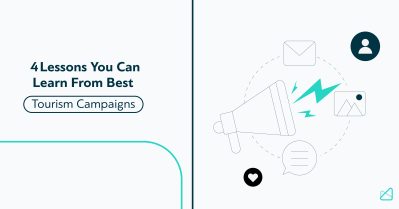Understanding the Important Role of Technology in Tourism Marketing

The travel industry has always been thriving on technological advancement. However, some tech pops up in the real world more while other solutions are nowhere to be seen. For instance, under the hood of a modern marketing strategy, there is nothing but technology.
Yet, since it remains invisible, the importance of technology in the tourism sector remains elusive to many people, especially in tourism marketing.
Given the pace at which technology is advancing, it is safe to assume that its role in marketing will become even more important. To understand its importance, we decided to put together a sort of a mini-recap of tech use cases in tourism marketing.
What is tourism marketing?
We often see marketing initiatives used in a specific sector being named after that industry. With this in mind, it is easy to pick up on what tourism marketing is. The term simply refers to all marketing strategies used in the travel and hospitality industry.
It encompasses both B2C and B2B marketing strategies. Tourism marketing can have various goals ranging from increasing awareness of specific attractions to helping a hotel attract more guests.
Tourism marketing encompasses both traditional marketing methods and strategies powered by information technology, such as digital marketing and social media marketing. But how exactly are tech-based solutions used in tourism?
How is technology used in tourism?
Technology is not strictly reserved for tourism marketing. It found various use cases transforming global tourism as we used to know it and even creating new opportunities such as sustainable tourism. Let’s quickly go through the most common technology use cases in tourism aside from marketing.
Reservations
Two decades ago, almost 100% of reservations in the travel sector were handled via telephone calls. Fortunately, these inefficient systems are no longer with us. They caused too many errors due to the variety of reservations, often weeks and months in advance. Today tourists can make reservations with a few simple clicks. The hoteliers have access to reservations and even get notifications when a reservation is due. They can even track and record guests’ information and use it to fuel future marketing initiatives.
Information
Instead of relying on printed brochures that are often outdated, tourists today have access to websites, forums, and social media. They can use blogs and Slideshare presentations to discover new attractions, learn more about specific destinations, and even interact with fellow travelers to seek advice and opinion.
The Information Communication Technologies (ICT) make it effortless for tourists to look up and compare tourism products on demand. AI also has a use case in information distribution, such as AI assistants. Given its versatility, AI has found use cases in other processes, including room mapping, dynamic price tracking, and analytics.
Experience
Technology is also bound to improve the experience tourists get from their arrangements. There are two main things tech can do to take the experience to the next level. First, it allows hoteliers, agents, and OTAs to personalize offers using past interactions with travelers delighting them with destinations they find attractive. Second, AR and VR can make certain experiences available to everyone while taking individual and environmental risks out of the equation.
Communication
Finally, we have communication which is already a technology-based activity. With the modernization of telecommunication networks, expansion of the Internet, and new apps, communication has never been easier, both internal and external.
Here is why technology is so important in tourism marketing.
Why is technology important in tourism marketing?
Technology is so important in tourism marketing that you can easily say that there would be no modern tourism marketing without it. Let’s see why exactly.
Technology introduced automation to remove redundant tasks. With redundant tasks gone, marketers can focus on more important things. Plus, they are not overworked, leading to fewer errors across the board.
Then we have the data that technology gives marketers access to these days. Instead of basing decisions on a hunch, they can use data to create efficient marketing strategies. In other words, technology has enabled tourism to benefit from data-driven marketing—other big data solutions such as Hotelmize leverage data to unlock hidden hotel booking profits.
Marketing based on cutting-edge technologies resonates perfectly well with the current generation. Millennials and Gen Y make the most of the traveler audience, and they are both comfortable around technology.
Finally, technology enables everyone in the tourism sector to leverage the most versatile resource available today — the Internet. There are countless advertising opportunities online, and they are all enabled by technology.
Examples of how technology can be used in tourism marketing
Everyone ranging from hotels and travel agents to big-game OTAs uses tourism marketing to some extent. To understand the value technology brings to tourism marketing, you need to see how it is used. Below you can find a couple of case studies of the use of technology in tourism marketing.
Case studies of the use of technology in tourism marketing
First, let’s quickly review the case study from New Zealand evaluating the use of the Internet and Web technology in the promotion and marketing of attractions and destinations. The researchers used the extended Model of Internet Commerce Adoption.
The goal was to evaluate the current situation in New Zealand’s Regional Tourism Organizations. The case study discovered that the level of Web site development in the organization has significantly gone up over the last decade.
The results: The study puts light on the high adoption rate of web-based technologies among Regional Tourism Organizations in New Zealand. Running a business in the tourism sector without at least a website is borderline impossible today. The study finds out that organizations in this niche had a website and used various relevant app solutions to provide a better experience to their customers.
We also have a case study on Augmented Reality and its use case in tourism marketing. The role of AR in tourism marketing can be huge as it facilitates interaction. Thanks to AR, tourists can have interactive experiences and make informed decisions. Offering this type of next-level experience can also help a brand stand out from the crowd and get more business.
The results: The study extensively researches the potential impact of widespread adoption of AR technology in the tourism sector. The researchers suggest to agents, hotel owners, and OTAs start using AR at different stages of tourism and hospitality marketing.
According to researchers, AR can make a huge difference and facilitate the decision-making process for customers. The interactive experience it offers is both effective and enjoyable and can help you attract more guests and generate more profit.
Next, we have a case study of Bali, Indonesia. VR is not a brand-new technology, but many industries waited to see what it could offer before they started to implement it. The researchers analyzed what VR technology has to offer to tourism marketing.
The results: The case study showcases exciting results. VR has already found its use in tourism marketing in Bali. It’s used by travel businesses of all sizes to enhance experiences and advertise attractions and destinations.
The most used are VR tourism videos that enable potential guests to freely explore the scene from the comfort of their homes. For now, the majority of the videos are monoscopic, which means that they can be viewed from any device.
However, stereoscopic VR videos are gaining popularity in Bali. Even though they require VR headsets, these videos provide a more immersive experience. They are more informative and have higher conversion potential than monoscopic ones.
Finally, we have a study of the influence of big data analytics on sustainable tourism supply chains. Every organization in the tourism industry generates data. This data, in addition to all the publicly available data, make big data. Organizations in the sector can use it to make informed decisions.
The results: The study finds that big data analytics in planning, coordination, and control is very important for enabling a sustainable tourism supply chain. The researchers point out that high technology adoption rates enhance the potential of big data analytics.
Businesses with several real-time data pipelines had access to more data in general. These businesses recorded improvements in productivity, revenue, and increased accuracy in forecasting demand and supply in the target market.
Conclusion
With so many implications technology has in tourism, it’s logical to see that it enables tourism marketing as well. Given the current developments, it’s safe to assume that technology is here to stay, and the future of tourism marketing is unimaginable without technology.
Subscribe to
our newsletter
Yay! You are now
subscribed to our
newsletter
Mize is the leading hotel booking optimization solution in the world. With over 170 partners using our fintech products, Mize creates new extra profit for the hotel booking industry using its fully automated proprietary technology and has generated hundreds of millions of dollars in revenue across its suite of products for its partners. Mize was founded in 2016 with its headquarters in Tel Aviv and offices worldwide.
Related Posts

Opening Up to New Markets While Maintaining the Brand
8 min. Case study of adapting the Mize brand for the East Asia market Making a cultural adjustment – finding the balance between global and local The process of growing globally can be very exciting and, at the same time, challenging. Although you are bringing more or less the same products and vision, the way […]

Travel Niche: What It Is, How to Leverage It, Case Studies & More
14 min. Niche travel is one of the few travel sectors that have maintained their pre-COVID market growth. By catering to specific traveler segments, niche travel developed products around adventure travel, eco-tourism, LGBTQ+ travel, and wellness retreats. Take adventure tourism as only one segment of the niche tourism market. In 2021, it reached 288 billion […]

4 Lessons You Can Learn From the Best Tourism Campaigns
13 min. Businesses in the tourism industry rely heavily on marketing to generate leads and boost conversion rates. Tourism marketing is as old as tourism itself – and it always reflects the destination and service benefits relevant to the current travelers’ needs, wants, and expectations. In other words, tourism campaigns must constantly move forward, and […]
